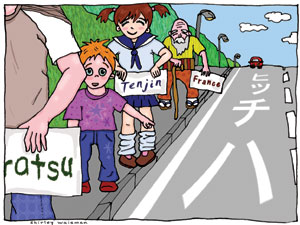
It's hard to get further off the beaten track in Japan than by hitchhiking. I've never done it and the thought had never really occurred to me since I've associated hitchhiking with grizzly murders from horror flicks or sitting outside in crappy weather for hours on end.
Our guest expert on the subject David Martindale, from Hitchhiking Without A Hitch a blog detailing his 59 hitchhiking rides around Hokkaido, begs to differ with this negative stereotype. He's here to tell us how to have a fun, culturally enriching, and Japanese language improving jaunt around the back roads of Japan!
In this interview David fields 16 tough questions designed to give us the confidence to get off the comfy Japanese train chairs and on to the road with thumbs flying proudly!
1. Trains are so comfortable, not to mention punctual. Why should I hitchhike?
Hitchhiking in Japan is more than a just means of transportation. It's a conversation. It's a story. Every trip is unique. In Japan in particular, you are likely to find yourself in crazy/amusing/interesting situations with surprising frequency. During my trip, I was invited to a hockey party, climbed a mountain, attended festivals, taught at a school for a day, earned my keep at a ryokan, and met a ton of incredible people. At first I thought I was just lucky, but the adventures kept on coming!
Hitchhiking is a thrilling breath of fresh air from the typical tourist routes and agendas. The fact that it's much cheaper is an added bonus. In my book, there's no better way to travel in Japan.
2. The Japanese generally have strong boundaries against people "outside" their social network. Despite this, you managed to get people to not only pay attention to you, but let you hitchhike with them. Why do you think that is?
I think that, to some degree at least, stereotypes don't apply for hitchhikers. It's true that the Japanese can be more closed off to strangers, but my drivers were generally open and outgoing. This is no doubt because of the very biased sample I had; even if only one in fifty drivers would dare to invite a stranger into their car, that one in fifty is exactly who would stop and cheerfully offer me a lift. There's also a very strong culture of hospitality in Japan, such that once you are in the car, you are on the "inside," so to speak.
As for specific motivations, I was curious about this as well, and asked some of the drivers why they chose to stop.
3. Japan is known for its regional identities. Do you think that hitchhiking worked particularly well in an area like Hokkaido, or do you think it would work equally well in Kanto or Kansai?
While Hokkaidans certainly have a reputation for being friendly and laid back, I've read accounts of successful hitchhiking in many other parts of Japan as well. In general, rural areas are better for good, frequent rides. I'd like to try hitchhiking in Shikoku and Kyūshū next.
4. Hitchhiking has kind of a bad rap in the US because of its negative and scary image in the media. What do Japanese people generally think of hitchhikers?
I'm not sure how hitchhikers in general are viewed, but a lot of people I met were afraid for my safety. "I can't believe you just hop in the car with so many strangers!" Hitchhiking is quite rare in Japan and is something that most people there would never consider doing.
That said, I think people generally overestimate the danger involved. I know this sounds a bit morbid, but I think, statistically, I was far more likely to be hurt in a car accident than at the hand of a maniacal, chainsaw-wielding madman.
Still, I always look for clues to expose potentially dangerous drivers. If you can see a bloody knife under the seat, hastily covered by an extremist anti-establishment magazine, perhaps you should think twice. abunaideshou 危ないでしょう…

5. What kinds of people usually picked you up? Did you notice any patterns? Who should future hitchhikers wave wildly at for their best bet as a ride?
Actually, there were almost no patterns in the types of people who picked me up. I got rides with students, retirees, businesspeople, cooks, farmers, a hairdresser, a professional cyclist, and even a CEO. I wouldn't give up on any car unless the seats were full (or if that bloody knife were visible of course).
I'm a fan of statistics, so I collected some information about each ride and driver during the trip. I'll be posting more details on my blog in future.
6. Did you speak Japanese a lot while riding with your hitchhiking hosts or were they more interested in getting free roadside English lessons?
I spent a lot of time speaking Japanese on the trip, which was great for me. It really took me out of the "English bubble" I'd been living in, and my Japanese improved a lot as a result. Kids in particular were great to chat with, and never shy about asking questions.
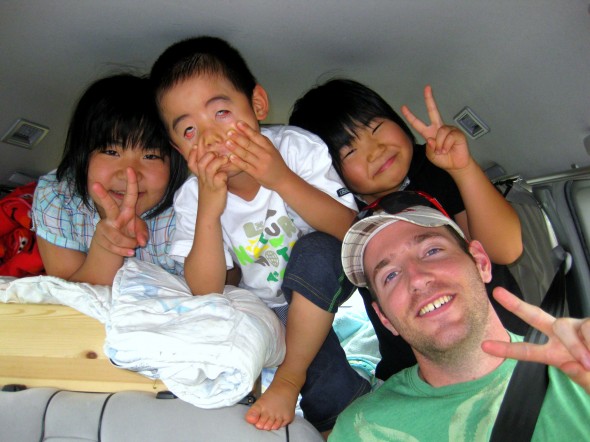
Regarding people looking for English lessons, I only encountered one. Overall though, not many of the drivers who picked me up could (or dared to) speak English.
I'd say that understanding some Japanese is fairly important to having a good time hitchhiking there. A basic vocabulary should be fine, and you can get from A to B even without that, but they will be quiet rides if you've got nothing to work with. Some hitchhikers even hold a sign saying "nihongodekiru 日本語できる" to help their chances of a ride, but I found it not to be necessary. (Even destination signs are generally not needed except in special circumstances, and can often work against the hitchhiker.)
7. What was the worst situation you found yourself in while hitchhiking, and how did you manage to get out of it?
Luckily, I was never in truly dire circumstances. It helped that I had lots of good advice via The Hitchhiker's Guide to Japan, by Will Ferguson.
I ended up lost for several hours in Tomakomai, at the mercy of convenience store employees' directional abilities. Of course getting lost is part of traveling, and I was eventually helped out by a friendly surfer named Osamu.
8. Japanese people can be OVERLY accommodating sometimes. What was the most over the top gesture of hospitality that you encountered?
Would you call a marriage proposal over the top? She explained that she had no husband and said, "You're good looking and I'm rich — kekkonshimashouka 結婚しましょうか"?
Another time, a man offered to drive me to the nearest city, but only if I stayed at his house for three days. I politely declined that one.
In general though, the gestures of hospitality were wonderful. I can't overstate the kindness I was shown.
9. Where did you usually stay once your ride for the day finished?
Because I had a tent, I was able to stay almost anywhere. I pitched it in parks, near beaches, and campgrounds where possible. Youth hostels were also nice for a break from camping.
To get a complete picture of where I stayed, I have prepared the following pie chart.
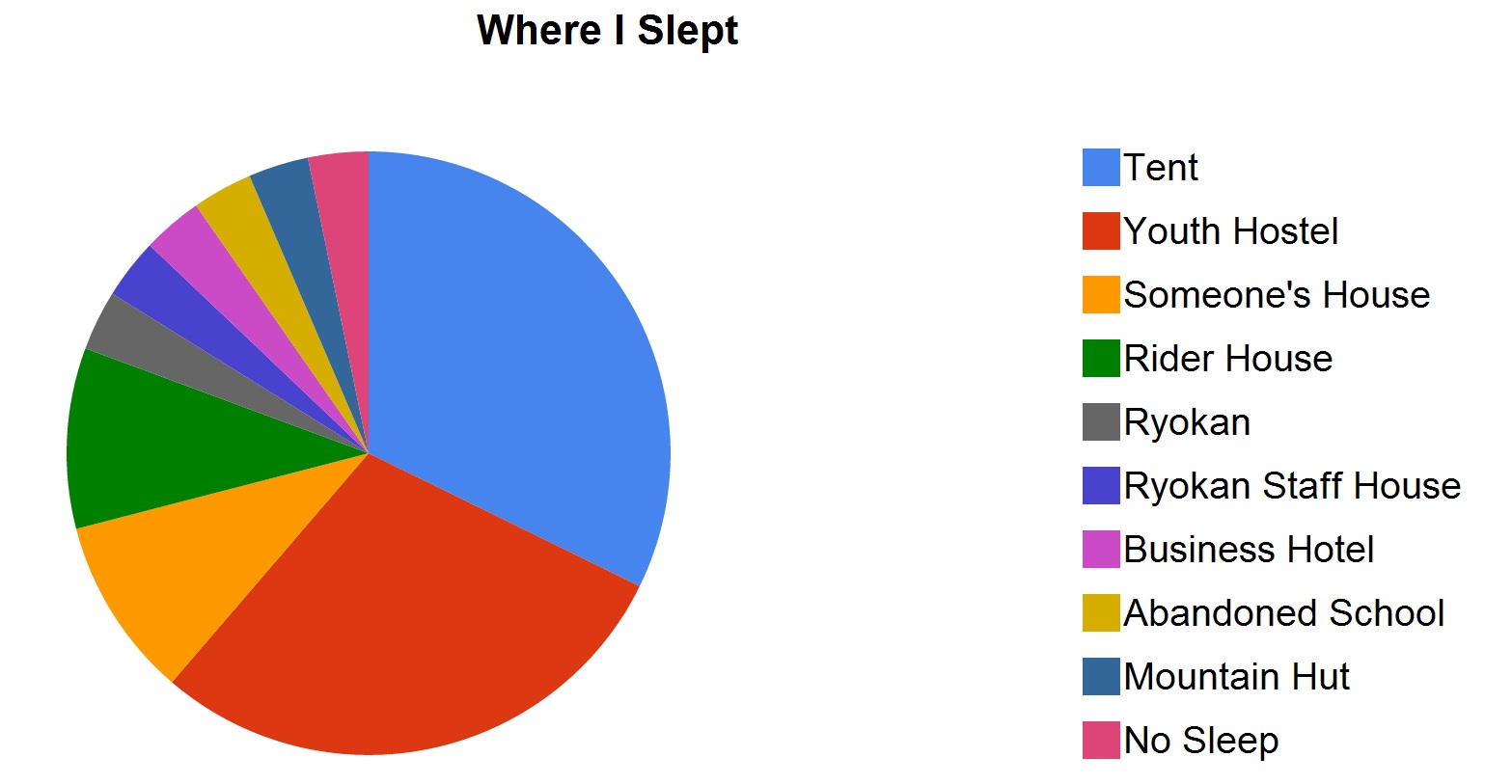
10. Did you use any online resources to help you find housing, rides, etc like couchsurfing.org?
I did use couchsurfing, but only once. One of the great things about my trip was its lack of planning — on a given day I could go as far as I wanted or not go anywhere at all, which made arrangements with hosts tough to make. The one time I did use it was excellent, though. I highly recommend joining the couchsurfing community.
11. Should girls feel equally safe hitchhiking in Japan as guys? What is your advice for the hitchhiking ladies of Japan?
Japan is one of the safest countries in the world, but it's ultimately up to the girl to decide whether it's safe enough. Girls who are hesitant could try hitchhiking with a friend. Or with me :P
12. What was the wonkiest car you ever rode in while hitchhiking?
I felt pretty cool sitting in Kawai-san's SK-139.
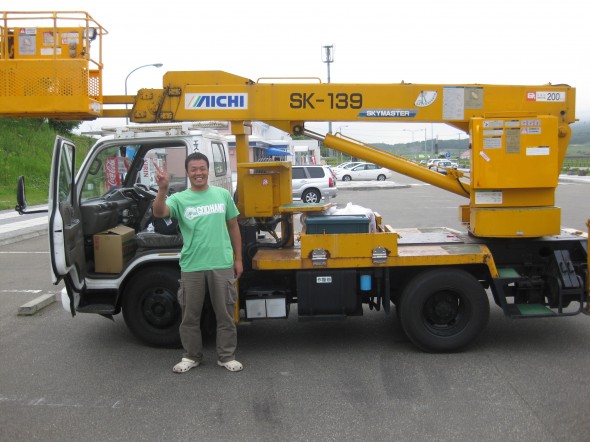
13. What season is best to hitchhike in?
I'd avoid the rainy season and the winter months if you're camping.
14. What happens when no one picks you up?
Wait longer!
The "hitchhiker's mantra" can be very comforting during the longer stretches of waiting. Eventually, someone will stop.
On average, I waited about 20 minutes per ride. The longest I ever waited was 1.5 hours. I received 59 rides during my trip though, and with that many rides you're bound to have one or two tough waits.
15. Did you ever get caught in a storm? What did you do?
Usually, when it rained I was lucky enough to have shelter. konbini コンビニ are great for this*.
There were times when I tried to hitchhike in heavy rain, but I rarely had success. Rain works against the hitchhiker. One might think you'd benefit from drivers' sympathy in the rain, but bad weather has the even stronger effect of making everyone look a little more sinister. Picture dark gray clouds, blankets of rain, and Mother Teresa standing on a street corner. Is she concealing a knife? Possibly. Never trust a wet nun.
(I took an informal poll of my drivers and discovered that their preferred convenience store was split 50/50 between 7-11 and Seikomart. No love for Lawson, sadly.)
16. In your experience, what should future hitchhikers avoid doing so as to maximize the good times and limit the bad?
May I offer a top ten?
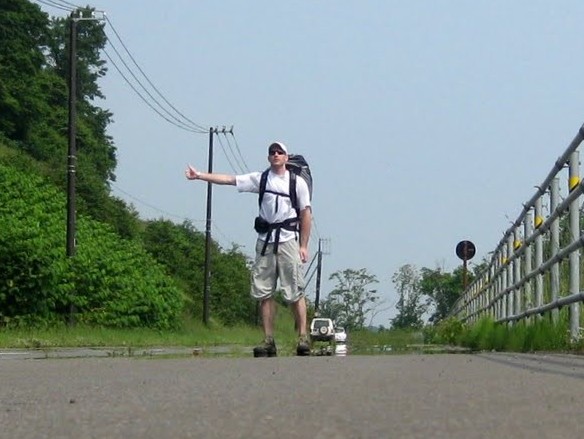
- Read The Hitchhiker's Guide to Japan. It's full of useful information and even possible routes to take. The list below is good, but it's no replacement.
- Try to stay in rural areas (urban hitchhiking is possible, but it's harder and less rewarding)
- Bring a good map, a camera, and a journal.
- Be as outgoing, talkative, and generous as possible with your drivers. They will generally act likewise.
- If possible, bring small, inexpensive gifts for your drivers and hosts. You will want to show your gratitude, if only with a small token.
- Bring a tent to save money (also, like turtles, you're never truly stranded when your home is on your back).
- Be clear that you need not reach your destination in one ride. When asked where you're going, phrases like "nishi no hou 西のほう" or "[name-of-town] no hou [name-of-town]のほう" work well).
- Understand that some people will offer to help you only because they feel obligated. Try to recognize these situations and politely decline.
- When possible, wait on the edge of town to avoid local traffic.
- Stop hesitating and do it! Get out there, hold out your thumb, and smile. Adventure awaits.
